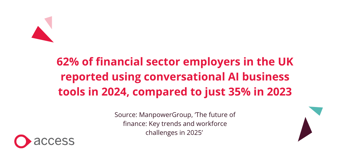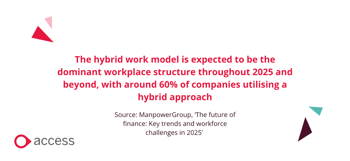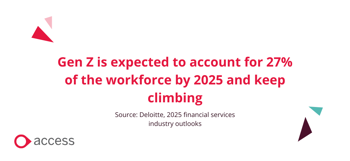
What’s driving HR transformation in financial services?
The financial services sector is navigating a particularly dynamic landscape in 2025 with economic uncertainty, regulatory shifts, and rapid technological innovation are fundamentally reshaping HR priorities across banking and insurance.
Manpower Group report that most large financial institutions have seen non-interest expenses such as wages grow faster than revenues since 2022. They also report that 79% of UK employers in the sector anticipate they will struggle to find the skilled talent they need in 2025. HR teams are being asked to do more with less whilst simultaneously attracting and retaining talent in a competitive market.
Regulatory complexity also continues to intensify. Financial institutions face evolving compliance requirements around data protection, employee rights, and reporting standards. HR functions are responding by adopting systems that can automate compliance tracking and reduce the administrative burden on teams.
AI, automation, and predictive analytics are expanding what is achievable for HR operations. Manpower Group also report that the financial services industry witnessed a significant surge in adoption, with 62% of financial sector employers in the UK using conversational AI business tools in 2024, compared to just 35% in 2023. These tools help HR teams reduce manual work and plan workforce needs more effectively.
Interestingly, despite these technological advances, large financial institutions are increasingly investing in people-first strategies. There's growing recognition that resilience and retention depend on creating workplaces where employees feel valued, supported, and equipped to develop their careers.

What are the top HR trends in financial services for 2025?
Digital HR Transformation at Scale
Financial services organisations are moving towards comprehensive, cloud-based platforms that unify payroll, learning, performance management, and analytics. The global HR technology market is set to grow from $40.45 billion in 2024 to $81.84 billion by 2032, according to PwC’s The Fearless Future: 2025 Global AI Jobs Barometer, reflecting the scale of investment in these solutions.
Embedded AI is also becoming increasingly sophisticated. ManpowerGroup, in their ‘The future of finance: Key trends and workforce challenges in 2025’ insights piece note that 62% of financial sector employers in the UK reported using conversational AI business tools in 2024, compared to just 35% in 2023. These tools help HR teams flag potential retention risks before they become critical and automate routine compliance tasks that previously consumed significant time.
HR teams are increasingly using mobile platforms to support hybrid and remote employees. Employees increasingly expect to access key HR functions from wherever they're working, whether that's updating personal details or accessing learning resources. To discover other strategies and tups for managing remote and distributed workforces, check out our blog on The challenges of managing a remote workforce - and how to overcome them.
Data-Driven Decision Making
HR leaders are using real-time dashboards to track engagement, turnover, and DEI metrics.
Predictive analytics is helping forecast talent gaps and workforce planning needs.
Benchmarking tools are enabling cross-department performance comparisons.
Predictive analytics is becoming more commonplace in HR, with algorithms analysing historical data to identify employees at risk of leaving, enabling targeted retention efforts, according to PwC’s The Fearless Future: 2025 Global AI Jobs Barometer.
HR leaders are using real-time dashboards to track engagement, turnover, and DEI metrics. By analysing historical patterns and current trends, HR teams can anticipate where skill shortages might emerge and take action before they impact business operations. This forward-looking approach is especially important in financial services, where the pace of change demands agility.
Benchmarking tools are enabling cross-department performance comparisons and helping organisations understand where they stand relative to industry standards.
Evolving Workforce Expectations
Netguru’s ‘AI in the Workplace: What Actually Works in 2025?’ research found that 83% of employees rank work-life balance ahead of pay (82%). The hybrid work model is expected to be the dominant workplace structure throughout 2025 and beyond, with around 60% of companies utilising a hybrid approach (Manpower Group) According to Manpower Group, organisations that actively invest in hybrid work culture report higher employee engagement and retention compared to those that adopt it passively.
Workers are also valuing flexibility in when and where they work; the Anthropic Economic Index report shows that 76% of workers said having flexibility in when and where they work influences their desire to stay with an employer. Gen Z and millennial talent are driving demand for ethical leadership and inclusive workplaces. These demographic groups are more likely to evaluate potential employers based on values alignment and DEI commitments. Learn how to align your values with candidate expectations in our Employer Branding Strategy Guide.

HR Trends in the Banking Industry
The banking sector faces distinctive HR challenges that are shaping specific trends within the broader financial services landscape. For a broader view of sector-wide HR challenges and how you can tackle them with actionable strategies, read our blog on HR challenges in financial services.
Retail and investment banks are focusing intensively on leadership agility and digital upskilling. As traditional banking models evolve and customer expectations shift towards digital-first experiences, banks need leaders who can navigate ambiguity and teams with the technical capabilities to deliver modern services. Gen Z is expected to account for 27% of the workforce by 2025 and keep climbing, according to Deloitte.
Compliance automation has become a priority, driven by increasing regulatory scrutiny across jurisdictions. Banks are implementing systems that can track regulatory changes, manage documentation, and ensure adherence to complex requirements. This can reduce risk whilst also freeing HR teams to focus on more strategic work.
Internal mobility and career pathing are receiving renewed attention as banks recognise the value of retaining top talent. Netguru show that 93% of employees say they are more likely to stay with an organisation that invests in their career development. Banking firms with clear pathways for progression and opportunities to move around the business can be in an advantageous position as a result.

HR Trends in the insurance Industry
Insurance organisations also face their own particular HR challenges. Moss Adams reports that 84% of organisations now have formal DEI programmes and that companies with diverse leadership teams show 21% higher profitability.
There’s currently a significant issue with age in the insurance sector: The Insurance Times reports that about half of the people working in the London Market are aged over 40, and 26% of workers in the UK insurance market are aged over 50. Discover ways to tackle this lack of incoming workforce and the general talent gap in insurance in our blog, ‘Addressing the Insurance Talent Gap – How to Tackle the Finance Talent Shortage.’
AI is being deployed to streamline onboarding and training processes. Given the technical complexity of many insurance roles, effective onboarding is critical. AI-powered tools can personalise learning journeys, provide on-demand support, and help new employees become productive more quickly.
Employee wellbeing strategies are important for maintaining a highly engaged workforce, with organisations prioritising physical, emotional, and financial wellbeing to boost productivity and reduce attrition. Burnout, for example, remains a key concern in finance. Discover strategies to address it in our blog on burnout in the financial sector.
How can large financial firms stay ahead of these HR trends?
To remain competitive, large financial firms are placing greater emphasis on proactive HR strategies that prioritise data insights and employee experience. Much of this can be achieved by investing in the right type of HR technology, particularly technology that scales with you.
Invest in Scalable HR Technology
Platforms such as Access PeopleXD Evo offer integrated HR tools that may help financial firms simplify operations and improve efficiency. By bringing payroll, compliance, and employee engagement into one system, and using embedded AI and analytics, there’s potential to reduce admin load while improving decision-making.
Focusing on scalable, integrated tools may help future-proof operations and free up HR teams to focus on more strategic work, particularly recruitment
Build a Culture of Continuous Learning
Creating space for continuous learning, through upskilling programmes in compliance, data, and leadership, can help teams stay sharp in a fast-moving sector. Encouraging peer recognition and open communication might also strengthen morale and foster a sense of shared growth.
Thinking about learning as an everyday habit, not a one-off event, could make a real difference in long-term capability building. Discover how to strengthen leadership across your organisation with our guide to building leadership capability.
“We’ve kind of almost democratised learning. You can record something that’s useful and valuable in five minutes, and as soon as it goes out of date, AI can go in and update and interpret it. Everyone can become a creator of learning, and that really creates a culture of learning in your organisation.”
Oli Quayle, AI Evangelist at The Access Group in Episode 6: Future Proof Your People with L&D of our Do the Best Work of Your Life series on how AI can impact your learning culture.
Prioritise DEI and Wellbeing
Embedding inclusive recruitment practices and using DEI dashboards to track progress may support more equitable outcomes. At the same time, offering mental health support and financial wellbeing initiatives tailored to the pressures of the financial sector could help retain top talent and build resilience.
Recent sector studies suggest that inclusive recruitment and wellbeing programmes may contribute to higher employee satisfaction and improved organisational outcomes. For more on embedding resilience and performance, explore our guide to building and sustaining a high-performance culture.
Expert Insight
End-to-end HR solutions can also help build a strong talent pipeline.
Emma Parkin, Head of Propositions at The Access Group, details how end to end HR solutions impact and transform recruitment. Watch the full webinar, ‘Recruitment Under Pressure: Turn Market Challenges into Advantages’ and discover more about the current state of recruitment in the UK, as well as witnessing PeopleXD Evo in action.
What does a future-ready HR strategy look like in financial services?
HR strategies that anticipate regulatory updates and workforce shifts are helping financial firms adapt more effectively to sector changes. For financial services firms, that also means proactively transforming how people, processes, and platforms work together.
Auditing current HR practices, identifying gaps, and aligning with emerging trends like AI adoption, continuous learning, and inclusive culture-building can help firms stay resilient and competitive.
If you're exploring how to modernise your HR approach, Access PeopleXD Evo offers a powerful, scalable platform designed to meet the complex needs of financial institutions. From compliance and payroll to engagement and analytics, it’s built to help you lead with confidence. Arbuthnot Latham found that PeopleXD Evo has produced significant time savings in their operations:
“Since adopting Access PeopleXD, we’ve observed a notable improvement in our end-user experience. The HR solution has eliminated the necessity for manual intervention, reducing back-and-forth email exchanges considerably. This efficiency has resulted in valuable time savings for the team”
Andrew Dagger, Group HR Director
Discover how PeopleXD Evo can support your future-ready HR strategy:
Access our 4 minute demo
Book a personalised demo
Download our brochure

 AU & NZ
AU & NZ
 SG
SG
 MY
MY
 US
US
 IE
IE
